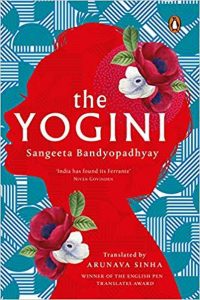Tilted Axis Press was founded in 2015 by Deborah Smith, a British translator of Korean fiction. Smith rose to international literary prominence for translating Han Kang’s The Vegetarian and subsequently winning the Man Booker International Prize for Fiction alongside Kang. Since 2015, the U.K.-based publishing house has regularly published critically acclaimed translations of contemporary Asian fiction, nonfiction, and poetry, boasting translations from languages such as Korean, Japanese, Tamil, Hindi, Bangla, and even Telugu (among others). This year, Tilted Axis Press returns to the spotlight for its publication of the novel Tomb of Sand, written by Geetanjali Shree and translated from Hindi by Daisy Rockwell in 2021. Tomb of Sand is the first Hindi-language novel to be longlisted and shortlisted for the International Booker Prize. This major accomplishment for Indian, international, and translated literature has now caused a resurgence of interest in the press’s catalog.
The Yogini by the Bengali-language author Sangeeta Bandyopadhyay, published in 2019, is another relatively recent translation from the press. Two of Bandyopadhyay’s earlier novels, Panty in 2016, and Abandon in 2017, were also published in translation by Tilted Axis Press, and prior to these novels, Bandyopadhyay wrote a number of short stories and novels. She currently works as a newspaper columnist and film critic in Kolkata. The Yogini, or Jogini in the original Bengali, follows a young woman named Homi. At first, Homi’s story seems to epitomize modern urban life: she works as a journalist for a TV studio and has recently fallen in love with and married a banking executive, Lalit. Neither of them likes to cook, and neither of them needs to. This picture of success, however, is thrown into disarray when Homi begins to see a hermit—invisible to everyone else around her—whom she believes is a manifestation of her fate. As she grows increasingly obsessed with this man, her carefully constructed universe shatters into pieces. The Yogini, as well as Panty and Abandon, were translated from Bengali by Arunava Sinha, who has translated over fifty Bengali texts into English and won the Muse India translation award for Buddhadeva Bose’s When the Time is Right. The Yogini, too, won the English PEN Award.
The success of The Yogini reflects the increased stature of translated literature on a global stage. Bandyopadhyay’s writing and Sinha’s translation is undeniably electric: the novel is an addictive two hundred pages. The English novelist Niven Govinden said about Bandyopadhyay, “India has found its Ferrante”, a quote that is now widely used to promote Bandyopadhyay’s writing. Certainly, it is a snappy turn of phrase, but Govinden’s comparison is particularly notable in that it compares one widely translated author—Elena Ferrante—to another author who has also reached a larger readership through translation. While there remains a power imbalance in perceived “literariness” between Italian and Bengali, Govinden chose not to give Bandyopadhyay an English-language counterpart in his analogy, and it retains its power in spite of that.
Within the actual text too, there is a note before the novel begins about the word “niyati” (in Sanskrit)/“niyoti” in Bangla, which ostensibly means fate or destiny, but also refers to a state in which an individual believes they are controlled by these ultimately illusory forces. The inclusion of this explanation of a foreign word refuses to domesticize the novel to its English readers. Sinha also does not translate words like “salwar-kameez” or “lassi”. The meaning of the latter two words may seem obvious to a globally-conscious reader today, but that too shows how much progress has been made in expanding the worldview of primarily English-language readers. The canonical 1965 Kannada-language novel Samskara: A Rite for a Dead Man, written by U.R. Ananthamurthy and translated by A.K. Ramanujan similarly refused to translate “samskara” and included an explanatory note at the beginning, but U.R. Ananthamurthy and A.K. Ramanujan were lions of South Asian literature, and Samskara: A Rite for a Dead Man was published in English by the New York Review of Books and Oxford University Press. The positionality of Sangeeta Bandyopadhyay, Arunava Sinha, and Tilted Axis Press is entirely different, and yet, the fact that they can similarly keep an Indian text Indian exemplifies a magnificent literary development.
 Not only does the translation of The Yogini mark a new era in literature, but the novel’s emphasis on sexuality (a recurring theme in Bandyopadhyay’s work) is equally representative of changing gender politics. Kolkata-based author Anjana Basu proclaimed that “The 31-year-old Sangeeta Bandyopadhyay had reintroduced hardcore sexuality to Bengali literature”. Indeed, Bandyopadhyay’s earlier novel Panty is about a young woman who becomes fixated on a pair of women’s underwear left behind in her new apartment building. The Yogini takes a more historical view of women’s sexuality by moving backwards through time: Homi begins the novel in a passionate, love-and-sex-driven marriage, shifts to a women’s boarding house after her marriage dissipates, and then finds herself in a gender-segregated artistic community in Benares by the novel’s end. Despite this spatial and temporal travel, Homi never loses her sexuality as she becomes more and more enmeshed in female-only spaces.
Not only does the translation of The Yogini mark a new era in literature, but the novel’s emphasis on sexuality (a recurring theme in Bandyopadhyay’s work) is equally representative of changing gender politics. Kolkata-based author Anjana Basu proclaimed that “The 31-year-old Sangeeta Bandyopadhyay had reintroduced hardcore sexuality to Bengali literature”. Indeed, Bandyopadhyay’s earlier novel Panty is about a young woman who becomes fixated on a pair of women’s underwear left behind in her new apartment building. The Yogini takes a more historical view of women’s sexuality by moving backwards through time: Homi begins the novel in a passionate, love-and-sex-driven marriage, shifts to a women’s boarding house after her marriage dissipates, and then finds herself in a gender-segregated artistic community in Benares by the novel’s end. Despite this spatial and temporal travel, Homi never loses her sexuality as she becomes more and more enmeshed in female-only spaces.
Bandyopadhyay folds these explorations of gender into a larger narrative formally and stylistically concerned with questions of free will, fate, destiny, and individual autonomy within larger systems. The novel repeatedly asserts that Homi is a character tied to nothing—not her mother or father, not her husband, not her friends, not her job, not the religion in which she was raised—but her own fate, which seems to be the manifestation of the hermit. And what is any character in a traditional novel, short story, or play but a character tied to nothing but the fate the author, playing God, decides for them? Given Bandyopadhyay’s youth and her already-impressive body of work, readers certainly ought to pay attention to whatever this Author-God writes next.
*









Add comment